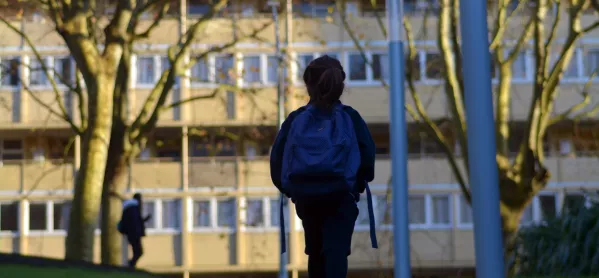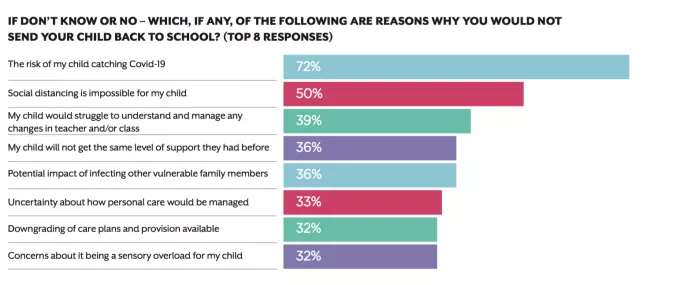- Home
- Let us decide when pupils with SEND return, say parents
Let us decide when pupils with SEND return, say parents

Nine out of 10 parents of children with special educational needs and disabiities (SEND) have said they should have the right to choose whether they send them to back school between now and December, a new survey shows.
The poll by the charity Parentkind also reveals that, at the start of July, almost a third of SEND parents were unsure whether they would be sending their child to school at the start of the new academic year.
Parents’ main concerns were that their children could catch Covid-19, would be unable to socially distance and would be unsettled by changes in the way their school operates.
Gavin Williamson: Parents could be fined for non-attendance from September
Exclusive: DfE criticised for ‘tick-box’ response to damning SEND report
SEND: DfE admits system is not working well
Parentkind carried out the online survey of more than 650 parents of children with SEND at the end of the last academic year.
The charity is now calling for parents of children with SEND to be given more time to decide whether to send their child to school.
Coronavirus: SEND parents’ fears over reopening schools
The government has said that parents could be fined for not sending their children to school from September, although it stressed that this action would be taken as a last resort.
Parentkind chief executive John Jolly said: “Our data shows that policymakers and school leaders must provide additional clarity to parents of children with SEND about what schools will look like from September, as well as what arrangements will be in place to ensure that their child will receive the provision they need and are entitled to.
“Rather than introducing punitive non-attendance fines, we suggest that the government communicates more clearly with parents about concrete plans for the next academic year.
“They must ensure that dialogue is two-way and that parents’ concerns are heard and addressed before the start of the new term.”
A report into the survey findings published today reveals that 90 per cent of parents of children with SEND believed that they should be given the right to choose if they send their child to school during the first term of the year.
Another 5 per cent were not sure and just 5 per cent thought they shouldn’t be given that right.
The poll also shows that, in July, 32 per cent of parents said they were unsure whether they would be sending their child to school and that it would depend on the arrangements in place.
Almost two-thirds ( 64 per cent) said that they would be sending their children back to school and 5 per cent said they definitely would not.
Of those who were unsure about their child’s return, 72 per cent said they had concerns that their child could catch the coronavirus and 50 per cent said they felt that social distancing would be impossible for their child.

The survey also highlighted parents’ fears that their child would struggle to adjust to changes, not get the same level of support that they had previously or that they could spread the virus to vulnerable family members.
Parentkind said there was also less confidence (compared with other parents) in returning children to school with no social distancing measures in place.
Only 27 per cent of SEND parents said they would be happy for their children to return to school without any social distancing in place. The poll found that 44 per cent would not be happy and 29 per cent were unsure.
A Department for Education spokesperson said: “Regular and full time school attendance from September will be essential to help pupils catch up on time out of the classroom.
“In all our decision making we have balanced the need to continue to control transmission of Covid-19 with the real and ongoing cost to children’s learning, welfare and health from being out of school.
“We have followed scientific advice in our guidance which shows it is safe for children to return to school as the risk of the virus to them is extremely low.
“This includes the vast majority of those with special educational needs and disability (SEND) who are not at greater risk of the virus than other children.”
Keep reading for just £1 per month
You've reached your limit of free articles this month. Subscribe for £1 per month for three months and get:
- Unlimited access to all Tes magazine content
- Exclusive subscriber-only stories
- Award-winning email newsletters



